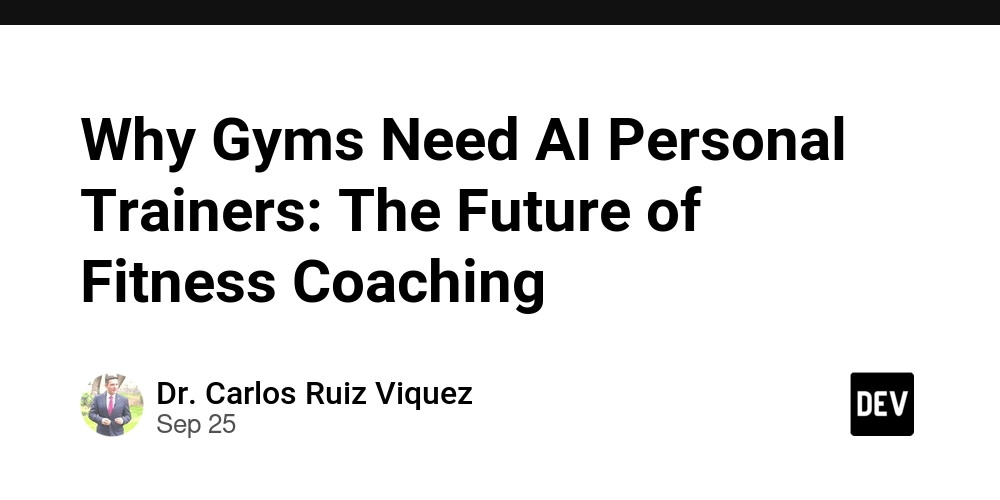Walking Into the Gym for the First Time
Imagine this: you’ve finally made the decision to improve your health (this is my personal experience). You walk into a gym for the first time, surrounded by endless machines — strange contraptions of metal and cables. You see people confidently lifting, pushing, pulling. Meanwhile, you’re standing there wondering: Where do I even begin?
You look around for help, but the floor trainers are either busy chatting, scrolling their phones, or half-heartedly pointing at a machine without much explanation. You consider hiring any them as a personal trainer — until you see the price tag. $60, $80, even $100 per hour. And even if you pay, you quickly discover many trainers follow a one-size-fits-all script: “Let’s do bench press today, the squat rack is full, so we’ll just do lunges instead.” No assessment, no analytics, no personalization.
This is the problem millions of people face every day in gyms across the world ( I’m honestly surprised I can never find a free spot at my gym here in California). And it’s why AI-driven personal coaching is not just a luxury — it’s a necessity.
Why Human Trainers Fall Short
Don’t get me wrong — there are excellent trainers out there. But the industry has structural problems:
- High cost barrier: Most people cannot afford professional coaching consistently.
- Lack of standardization: Certification quality varies widely. Many trainers improvise based on equipment availability rather than your long-term goals.
- Low personalization: Few trainers systematically track biometrics, progress, and feedback in real time.
The result? Frustration, wasted time, and in many cases — injuries.
Enter the AI Personal Coach
Now imagine a different scenario. You enter the same intimidating gym, but instead of guessing, you open an app — let’s call it MyCoachAI.site You place your phone on a stand, hit record, and start your first set.
The AI immediately analyzes your form. It tells you:
“_Your back is arching too much during squats — tighten your core.”
“Slow down your reps for better muscle activation.”
“Shift your weight slightly forward to reduce knee strain._”
This isn’t a vague pep talk — it’s real-time biomechanical analysis, powered by computer vision models trained on millions of movement samples.
Then, the app takes your baseline data — age, weight, fitness level, wearable biometrics — and generates a personalized training plan. Unlike a human trainer, the AI doesn’t forget your last session, doesn’t recycle the same generic workout, and doesn’t guess. It adapts continuously, adjusting volume, intensity, and rest times based on your progress.
The Future of Smart Gyms
What excites me most as a machine learning researcher is the potential for continuous feedback loops:
– Computer vision: Tracks posture, angles, and repetitions with millimeter precision.
– Wearables: Stream heart rate, HRV, oxygen levels, sleep quality.
– Adaptive learning algorithms: Adjust training load weekly to maximize progress and minimize injury.
This is not science fiction. The same techniques that allow AI to beat grandmasters in chess or recognize tumors in medical scans can also analyze your squat depth and recommend when to deload.
And because it’s digital, it scales: whether you’re in a high-end gym in New York or a small community gym in Mexico, you get access to the same level of expertise.
Why This Matters
Fitness is one of the most important determinants of human health. Yet access to personalized coaching has historically been reserved for the wealthy or the lucky few with exceptional trainers. AI democratizes this.
With the right app:
– Anyone can receive personalized, data-driven training.
– Progress is measurable, trackable, and adaptive.
– Motivation is reinforced through real-time encouragement.
– Injury risk is reduced through early corrections.
Final Thought
When I first stepped into a gym as a teenager, I remember feeling overwhelmed and lost. Years later, as a PhD specializing in AI & ML, I now see how preventable that confusion was. We don’t need to leave fitness to guesswork, intimidation, or overpriced sessions with underqualified trainers.
The future of gyms is AI-empowered coaching — a digital companion that sees, understands, and guides us better than any one-size-fits-all approach ever could.
We are standing at the edge of a fitness revolution. The question isn’t if AI personal trainers will be in every gym, but when, I am working on it already…


